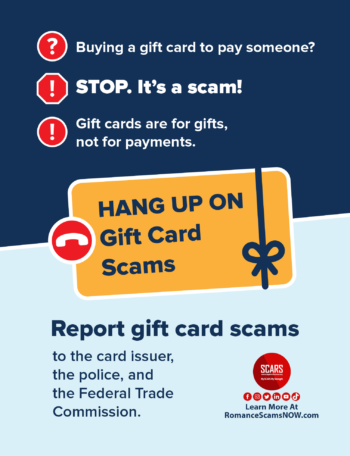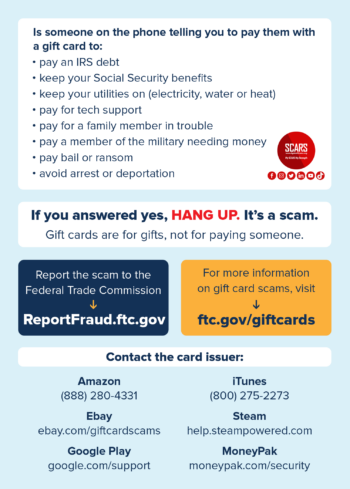Stop Gift Card Scams
Scammers Want Gift Cards Because They Are Untraceable & Unstoppable!
Never pay for anything using a gift card unless you are buying in a store!
Keep reading below!
Scammers Increasingly Demand Payment By Gift Cards
Paying Scammers with Gift Cards
Gift cards are a popular and convenient way to give someone a gift. They’re also a popular way for scammers to steal money from you. That’s because gift cards are like cash: if you buy a gift card and someone uses it, you probably cannot get your money back. Gift cards are for gifts, not payments.
Anyone who demands payment by gift card is always a scammer.
Many different kinds of imposters ask you to pay with gift cards
Someone might call you and claim to be from the IRS, collecting back taxes or fines. The caller might say he’s from tech support, asking for money to fix your computer. The caller might even say she’s a family member with an emergency and needs money right now.
What they all have in common an urgent need for you to send money right away.
Imposters will sometimes ask you to wire money to them but, increasingly, they tell you to go put money on a gift card – because wiring money is increasingly hard for them and it might be stopped.
Here’s what happens:
- The caller will often tell you to go buy a popular gift card, frequently, iTunes, Google Play, or Amazon.
- The caller will tell you to get the card at a particular store near you – often Walmart, Target, Walgreens, or CVS.
- They may even have you buy several cards at several stores.
- Sometimes, the caller will stay on the phone with you while you go to the store.
- Once you buy the card, the caller then will demand the gift card number and PIN on the back of the card.
- Those numbers let them immediately get the money you loaded onto the card.
- And once they’ve done that, the scammers and your money are gone, usually without a trace.
Other kinds of scammers, some of them also imposters, who might demand payment by gift card include:
- Callers pretending to be from a utility company, telling you to pay your bill by gift card or they’ll cut off your power or water
- Sellers on online auction sites who ask for gift cards to “buy” big items like cars, motorcycles, boats, RVs, tractors and electronics
- Someone posing as a servicemember to get your sympathy, saying he has to sell something quickly before deployment and needs you to pay by gift card
- Callers who say you’ve won a so-called prize, for sweepstakes you probably never entered – but first, you have to use a gift card to pay fees or other charges
- Someone buying something from you, probably online, who sends a check for more than the purchase price – and asks you to give them the difference on a gift card. (That check, by the way, will turn out to be fake.)
THESE ARE ALL SCAMS
In fact, if anyone tells you to pay by gift card, or by wiring money – for any reason – that’s a sure sign of a scam. Every time.
The Stats
Through the Federal Trade Commission’s Consumer Sentinel they hear from people across the United States about frauds they encounter in the marketplace.
One thing we all have learned from these reports is how scammers want to be paid. People are telling us all that they’re increasingly being told to pay with gift cards – specifically, by giving someone the PIN number off the back of a gift card. Often people are specifically asked for certain brands, like iTunes and Google Play cards.
To understand this issue better, we looked at fraud reported directly to the FTC. This is not about the use of gift cards to purchase retail goods, but rather their use as a payment vehicle for scams.
The FTC found that from January through September of 2018, gift cards and reload cards (like MoneyPak) were reported as a payment method in 26% of the fraud reports in which people told the FTC how they paid, up from just 7% in 2015 – a 270% increase. Con artists favor these cards because they can get quick cash, the transaction is largely irreversible, and they can remain anonymous. It is also because it is increasingly difficult for them to get money by other means, such as money transfer services.
People report that con artists direct them to buy gift or reload cards at well-known stores like Walmart, Target, Walgreens, and CVS. According to these reports, they demand some specific card brands. While these change over time, iTunes cards have been the top card brand by a wide margin since 2016. By contrast, Google Play cards were not reported in significant numbers until this year.
*Percentages are based on the total number of fraud reports that identify a gift or reload card as a method of payment. Reports provided by data contributors, reports that do not specify a method of payment, and reports classified as “shop-at-home/catalog sales” are excluded. Card brands are identified through keyword analysis of the narratives provided in this subset of reports.
Stepping back to look at all fraud reports available to the FTC from all sources, we found that losses – where people reported using gift or reload cards – reached $40 million in 2017, up from $20 million in 2015 and $27 million in 2016 (Source: FTC Consumer Sentinel Network Data Book, 2016 and 2017).
Through September of 2018, that number passed $53 million (last year that government data is available) and it is expected to double again during 2019/2020.
- Reports suggest eBay is a scammers’ current gift card brand of choice. It was Google Play and iTunes, but eBay has claimed the uncoveted top spot.
- People most often report using gift cards to pay scammers pretending to be the government, a business, tech support, or a friend or family member in trouble.
- People report that scammers tell them to buy gift cards at Walmart, Target, CVS, and Walgreens. And once they have you there, they’ll keep you on the phone as you pay for the gift cards.
While individual fraud losses using these cards have held steady at a $500 average loss per incident, people report losing a lot more to some types of scams.
Tech support scams are a notable example. When people report paying for fraudulent tech support services with a gift or reload card, the dollar loss is $959 (2018), up nearly 60% from $600 in 2017. This is also expected to go well over $1,000 by 2021.
It’s not just tech support scams. When people report paying a fraudster with a gift or reload card, about four times out of five the fraud they report it is an imposter scam – in fact, gift cards and reload cards are now the number one reported method of payment for imposter scams. These scammers pose as well-known businesses, family members, friends, or government agencies. They deploy various tactics to compel people to pay. They may pretend to be the IRS and tell people they cannot use other payment methods because of their delinquent tax status. They may even call iTunes cards “payment vouchers.” To avoid alerting store personnel, they often direct people to buy cards from several different stores, and they tell people not to talk to anyone about why they are buying the cards (typical scammer Gaslighting).
Familiarity with these tactics and awareness of the prevalence of gift cards and reload cards as a method of payment for fraud may help people to recognize and avoid a wide range of scams.
What if you paid a scammer with a gift card?
If you paid a scammer with a gift card, tell the company that issued the card right away. When you contact the company, tell them the gift card was used in a scam. Ask them if money is still on the card, and if they can refund your money. If you act quickly enough, the company might be able to get your money back. Be aware that some companies will not return any money even if the gift card hasn’t been used. Remember to keep the gift card itself, and keep the gift card receipt. Also, tell the store where you bought the gift card as soon as possible.
Here is a list of cards that scammers often use – with information to help report a scam. If the card you used is not on this list, you might find the gift card company’s contact information on the card itself, or you might need to do some research online. The FTC will update this list as new information becomes available.
WHEN SOMEONE DEMANDS TO BE PAID WITH A GIFT CARD, THAT’S A SCAM!
Things To Remember:
- Buying a gift card to pay someone?
- STOP. It’s a scam!
- Gift cards are for gifts, not for payments.
Reporting Gift Card Fraud
Payments to a fraudster made by gift card or reload card should be reported immediately to the card issuer.
It may not be possible to stop funds from being withdrawn from the card, but it is important to alert companies to card fraud because they may be able to track the end user and alert law enforcement.
Report Gift Card Scams To Card Issuers
Amazon
- Call 1 (888) 280-4331
- Keep the Amazon card itself and your receipt for the Amazon card.
- Learn about Amazon gift card scams, and how to report them here.
Ebay
- Call 1 (866) 305-3229 right away. Say “representative” after the first prompt. Then say “gift card” after the next prompt to connect with a live representative.
- Forward suspicious emails about Ebay gift cards you bought to spoof@ebay.com. Include the first 9 digits of your Ebay gift card.
- Keep the Ebay card itself and your receipt for the Ebay card.
- Learn about Ebay gift card scams, and how to report them here.
Google Play
- Call 1 (855) 466-4438
- Report gift card scams online here.
- Keep the Google Play card itself and your receipt for the Google Play card.
- Learn about Google Play gift card scams and how to report them here.
iTunes
- Call Apple Support right away at 1 (800) 275-2273. Say “gift card” to connect with a live representative.
- Ask if the money is still on the iTunes card. If so, Apple can put a freeze on it. You might be able to get your money back from them.
- Keep the iTunes card itself and your receipt for the iTunes card.
- Learn about iTunes gift card scams and how to report them here.
Steam
- If you have a Steam account, you can report gift card scams online here.
- Keep the Steam card itself and your receipt for the Steam card.
- Learn about Steam gift card scams and how to report them here.
MoneyPak
- Call 1 (866) 795-7969
- Keep the MoneyPak card itself and your receipt for the MoneyPak card.
- Learn about MoneyPak gift card scams and how to report them here.
Don’t see your card on this list? Search online for how to reach that card issuer. Is there no contact information available? Is the card issuer reluctant to help? And did you lose money to a scammer? Tell your fraud story to the FTC.
- Tell the Federal Trade Commission about any type of scam or fraud you detect at ftc.gov/complaint, or call toll-free: 1-877-FTC-HELP.
- Report it to your state Attorney General (for a list of state offices, visit naag.org).
- Report it on the SCARS|CDN™ Cybercrime Fata Network™ at www.Anyscam.com as well.
A Final Word About Gift Cards
Giving and receiving gift cards as gifts
If you get or give a gift card, here are some steps to follow:
- Buy gift cards from sources you know and trust. Avoid buying gift cards from online auction sites, because the cards may be counterfeit or stolen.
- Inspect a gift card before you buy it. Check that none of the protective stickers have been removed. Make sure that the codes on the back of the card haven’t been scratched off to show the PIN number. Report any damaged cards to the store selling the cards.
- Keep the receipt with the gift card. Whether you’re giving or getting, try to keep the original purchase receipt, or the card’s ID number, with the gift card.
- Read the terms and conditions of the gift card. Is there an expiration date? Are there fees to use the card, or for shipping and handling? Will fees be taken out every time you use the card, or after it sits unused for some period of time?
- Use the card as soon as you can. It’s not unusual to misplace gift cards or forget you have them. Using them early will help you get the full value.
- Treat gift cards like cash. If your card is lost or stolen, report it to the card’s issuer immediately. You might not get back the money left on the card – or you might get some, perhaps for a fee. You might need to show the receipt and the ID number on the card. Most issuers have toll-free telephone numbers you can call to report a lost or stolen card – find it on the card or online.
TAGS: SCARS, Information About Scams, Anti-Scam, Scams, Scammers, Fraudsters, Cybercrime, Crybercriminals, Gift Card Scams, Scam Victims, Online Fraud, Online Crime Is Real Crime, Scam Avoidance, Paying Scammers
PLEASE SHARE OUR ARTICLES WITH YOUR FRIENDS & FAMILY
HELP OTHERS STAY SAFE ONLINE – YOUR KNOWLEDGE CAN MAKE THE DIFFERENCE!
THE NEXT VICTIM MIGHT BE YOUR OWN FAMILY MEMBER OR BEST FRIEND!
By the SCARS™ Editorial Team
Society of Citizens Against Relationship Scams Inc.
A Worldwide Crime Victims Assistance & Crime Prevention Nonprofit Organization Headquartered In Miami Florida USA & Monterrey NL Mexico, with Partners In More Than 60 Countries
To Learn More, Volunteer, or Donate Visit: www.AgainstScams.org
Contact Us: Contact@AgainstScams.org







Leave A Comment